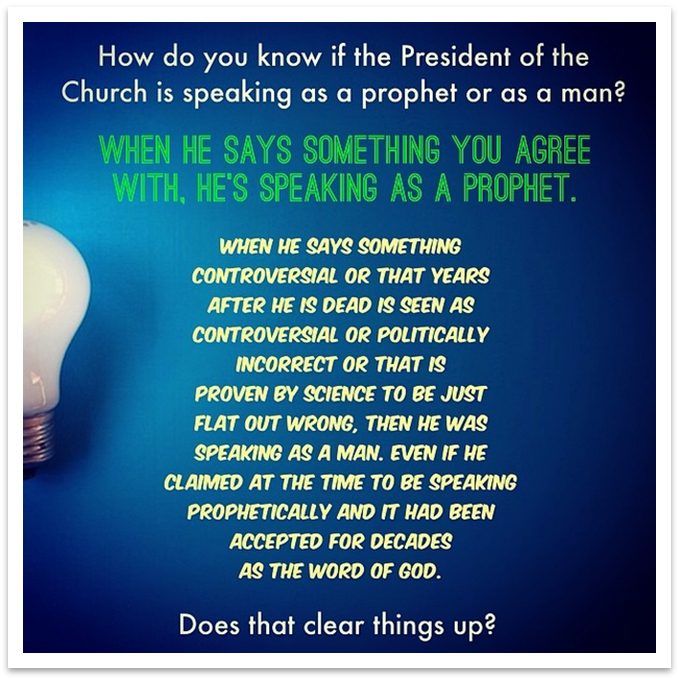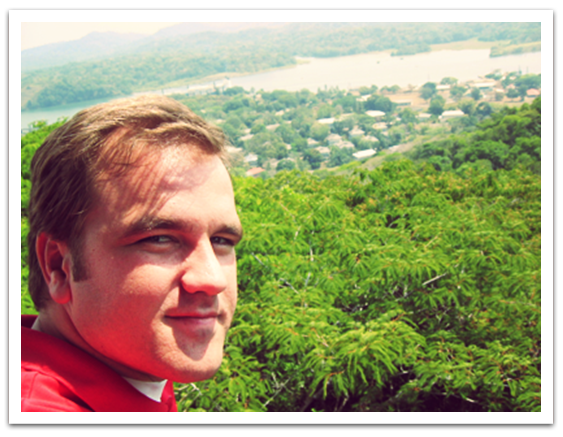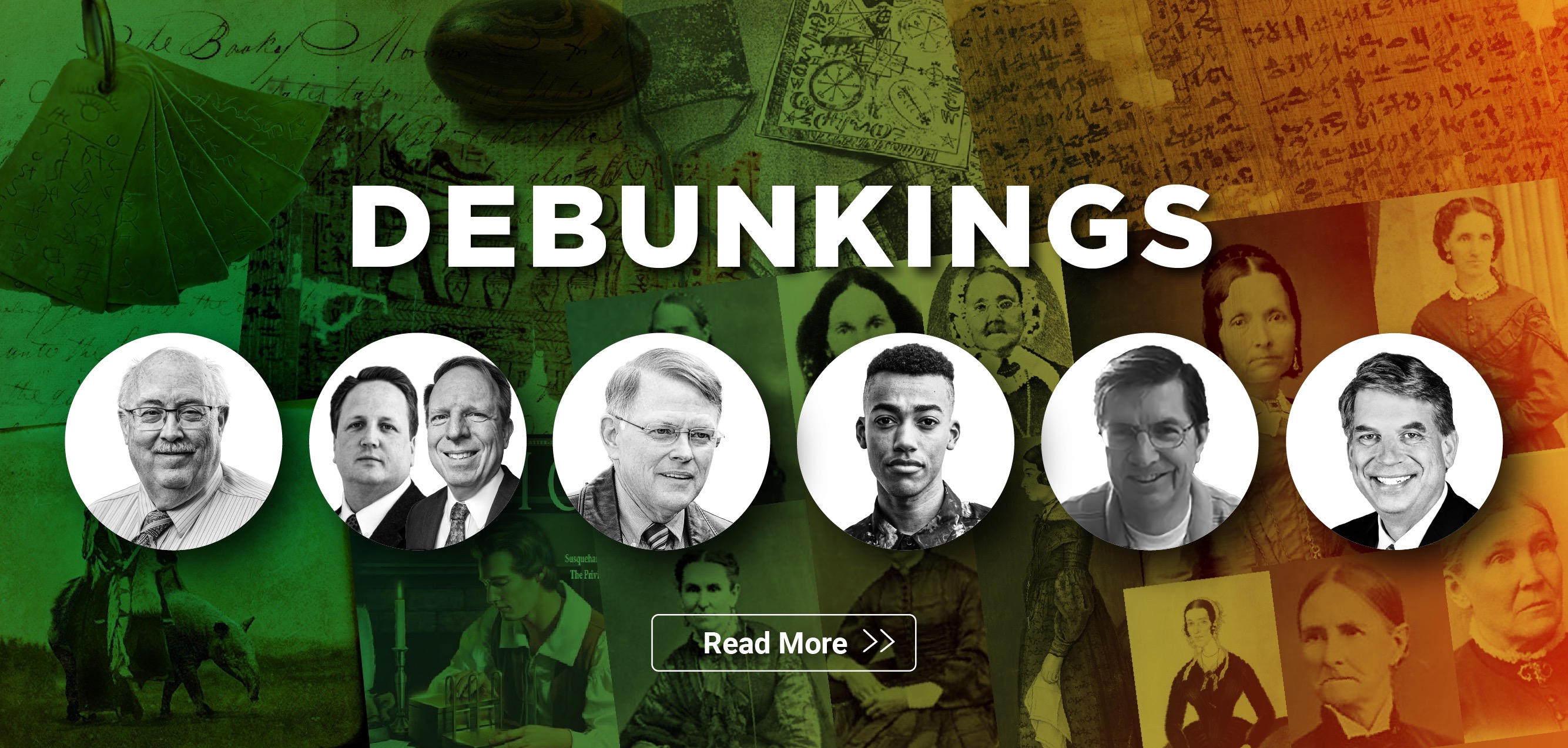Detailed Response
Prophets
Elder Andersen's Header Quote
“A few question their faith when they find a statement made by a Church leader decades ago that seems incongruent with our doctrine. There is an important principle that governs the doctrine of the Church. The doctrine is taught by all 15 members of the First Presidency and Quorum of the Twelve. It is not hidden in an obscure paragraph of one talk. True principles are taught frequently and by many. Our doctrine is not difficult to find.
The leaders of the Church are honest but imperfect men. Remember the words of Moroni: “Condemn me not because of mine imperfection, neither my father … ; but rather give thanks unto God that he hath made manifest unto you our imperfections, that ye may learn to be more wise than we have been” (Ether 12:6).”
— Elder Neil L. Andersen, "Trial of Your Faith," Ensign (November 2012)
Jeremy's Response
The irony here is that Elder Andersen’s doctrinal test does not even meet its own standard. The requirement that all 15 must teach an idea for it to be considered doctrine has not been taught by all 15. It is, instead, “hidden in an obscure paragraph of one talk.” Andersen’s definition of doctrine itself is therefore not doctrinal.
Andersen’s November 2012 attempt to redefine what is or is not doctrine is unprecedented in close to 200 years of Church history. Using Andersen’s new standard and criteria, the following is what I’ve been able to identify thus far as official Church doctrine:
- Proclamation to the World
- Okay, blacks can have the Priesthood and go to the Temple now – OD2
- Obey us
- Pay your Tithing
- Porn is bad
Andersen’s statements raise some interesting questions. For example, if something is not “doctrinal”, does that mean that it isn’t a “true principle”? Also, would God allow an individual who is sustained as a “prophet, seer, and revelator” to teach something in an official capacity that is neither a “true principle” or “doctrine”? What is the point of sustaining a “prophet, seer, and revelator” if we can’t trust the principles they teach unless the other 14 prophets, seers, and revelators corroborate those teachings? A corroboration which, historically speaking, rarely occurs?
Of course the leaders of the Church are imperfect men. That was never a question for me – even as a believing Mormon. The question is not whether or not the leaders are imperfect men or even if they’re honest.
The question is: Are these men, based on the evidence and the hindsight we now possess in 2014, really “prophets, seers, and revelators”?
"A few question their faith when they find a statement made by a Church leader decades ago that seems incongruent with our doctrine.”
These “prophets, seers, and revelators” are claiming to speak as spokesmen and prophets in the name of an unchanging god. They claim to be professing His eternal truths. The fact that their statements do not stand up to the test of time casts into doubt the similar claims of every man who follows in their so-called line of authority.
Adam-God
"President Brigham Young taught what is now known as “Adam-God theory”. He taught that Adam is “our Father and our God, and the only God with whom we have to do”. Young not only taught this doctrine over the pulpit at the 1852 and 1854 General Conferences but he also introduced this doctrine as the Lecture at the Veil in the endowment ceremony of the Temple."
- FairMormon agrees that Brigham Young believed and taught Adam-God but attempt to diminish it by making the unsubstantiated and unsupported claim that it was never presented as official doctrine.
Correct:
“Brigham Young appears to have believed and taught Adam-God, but he never developed the teaching into something that could be reconciled with LDS scripture and presented as official doctrine. Therefore, we simply don't know what Brigham Young meant, and modern leaders have warned us about accepting traditional explanations of Adam-God. Since the Church has rejected it, we won't be able to answer the question until the Lord sees fit to reveal more about it.”
FairMormon deleted their above response. See screenshot.
Jeremy's Response
“Brigham Young appears to have believed and taught Adam-God, but he never developed the teaching into something that could be reconciled with LDS scripture and presented as official doctrine.”
This is a perfect example of FairMormon’s “prophets aren’t really prophets” version of Mormonism.
A few years before his death, Brigham complained:
“How much unbelief exists in the minds of the Latter-day Saints in regard to one particular doctrine which is revealed to them, and which God revealed to me – namely that Adam is our father and God…Our Father Adam is the man who stands at the gate and holds the keys of everlasting life and salvation to all his children who have or ever will come upon the earth.”
– Deseret Weekly News, June 18, 1873
Here is a sustained “prophet, seer, and revelator” explicitly making it clear that the Adam-God doctrine was revealed to him by God Himself. Brigham taught this doctrine in General Conference twice, throughout his 25 year ministry, and even introduced this doctrine into the endowment ceremony of the Temples.
I’ll leave it to the reader to decide whether or not Brigham presented Adam-God as official doctrine.
Brigham Young pointed to modern revelation. As “prophet, seer, and revelator,” Brigham’s words (especially spoken over a General Conference pulpit twice) were official doctrine and his words superseded LDS scripture.
Also, whatever happened to a living prophet being more important than scripture? In President Ezra Taft Benson’s “Fourteen Fundamentals in Following the Prophet” #2 (“The Living prophet is more vital to us than the Standard Works”):
“When he concluded, Brother Joseph turned to Brother Brigham Young and said, ‘Brother Brigham I want you to go to the podium and tell us your views with regard to the living oracles and the written word of God.’ Brother Brigham took the stand, and he took the Bible, and laid it down; he took the Book of Mormon, and laid it down; and he took the Book of Doctrine and Covenants, and laid it down before him, and he said: ‘There is the written word of God to us, concerning the work of God from the beginning of the world, almost, to our day. And now,’ said he, ‘when compared with the living oracles those books are nothing to me; those books do not convey the word of God direct to us now, as do the words of a Prophet or a man bearing the Holy Priesthood in our day and generation. I would rather have the living oracles than all the writing in the books.’ That was the course he pursued. When he was through, Brother Joseph said to the congregation; ‘Brother Brigham has told you the word of the Lord, and he has told you the truth.’” (Conference Report, October 1897, pp. 18–19.)
Brigham declared that he never preached a sermon that the “children of men may not call scripture.” The false “Adam-God” doctrine was presented to the Saints as official doctrine due to the following reasons:
- As “prophet, seer, and revelator,” Brigham taught that his sermons were scripture. Scripture = official doctrine.
- Mormon teaching that modern revelation through a living prophet supersedes scripture.
- Brigham clearly and explicitly declared that “God revealed to me” Adam-God.
- Brigham Young taught this false doctrine twice over the pulpit in two General Conferences.
- Brigham Young introduced this false theology and doctrine into the lecture at the veil in the endowment ceremony in the Temples.
The fact that the Church later rejected Brigham’s false doctrine does not negate the fact that it was doctrine in Brigham’s day and it was presented as such to the Saints of Brigham’s day.
Even ignoring the dispute about whether something is doctrinal or not, how can we believe that Brigham Young was in fact a “prophet, seer, and revelator” when he was so wrong about something so fundamental to the Church? One cannot believe that the Adam-God teaching is incorrect and false without believing that Brigham Young was lying when he stated that God revealed the teaching to him. If Brigham Young was lying about God revealing such a fundamental teaching regarding the nature and name of God, what credibility does Brigham have and why should he be regarded as a latter-day “prophet, seer, and revelator”? Indeed, why should any of Brigham’s successors be regarded as “prophets, seers, and revelators”?
Yesterday’s doctrine is today’s false doctrine. Yesterday’s prophet is today’s heretic.
BYU professor Stephen E. Robinson wrote:
"Yet another way in which anti-Mormon critics often misrepresent LDS doctrine is in the presentation of anomalies as though they were the doctrine of the Church. Anomalies occur in every field of human endeavor, even in science. An anomaly is something unexpected that cannot be explained by the existing laws or theories, but which does not constitute evidence for changing the laws and theories. An anomaly is a glitch...A classic example of an anomaly in the LDS tradition is the so-called "Adam-God theory." During the latter half of the nineteenth century Brigham Young made some remarks about the relationship between Adam and God that the Latter-day Saints have never been able to understand. The reported statements conflict with LDS teachings before and after Brigham Young, as well as with statements of President Young himself during the same period of time. So how do Latter-day Saints deal with the phenomenon? We don't; we simply set it aside. It is an anomaly. On occasion my colleagues and I at Brigham Young University have tried to figure out what Brigham Young might have actually said and what it might have meant, but the attempts have always failed. The reported statements simply do not compute—we cannot make sense out of them. This is not a matter of believing it or disbelieving it; we simply don't know what "it" is. If Brigham Young were here we could ask him what he actually said and what he meant by it, but he is not here.... For the Latter-day Saints, however, the point is moot, since whatever Brigham Young said, true or false, was never presented to the Church for a sustaining vote. It was not then and is not now a doctrine of the Church, and...the Church has merely set the phenomenon aside as an anomaly."
FairMormon deleted their above response. See screenshot.
Jeremy's Response
This statement by BYU Professor Stephen E. Robinson is an unofficial apologist’s attempt to throw a latter-day prophet under the bus over an obviously false doctrine. It was not an “anomaly” or a “glitch.” It was a latter-day prophet in action teaching the doctrine for 25 years at the most important of venues. The reason why this unofficial apologist and BYU professors cannot “compute” or “understand” or reconcile Adam-God is because they cannot – or will not – accept the reasonable and possible conclusion that Brigham Young was not a prophet and that Brigham completely made stuff up as he went along.
Again, one cannot believe that the Adam-God teaching is incorrect and false without also believing that Brigham Young lied about God having revealed the teaching to him.
Blood Atonement
"Along with Adam-God, Young taught a doctrine known as “Blood Atonement” where a person’s blood had to be shed to atone for their own sins as it was beyond the atonement of Jesus Christ."
- FairMormon agrees that Brigham believed and taught Blood Atonement. FairMormon takes it further and adds 1912 First Presidency as also supporting Blood Atonement.
Critics commonly claim that during the administration of Brigham Young apostates were secretly put to death. They claim this is in line with the teachings of LDS leaders at the time that apostasy was the unforgivable sin, and that the only thing an apostate could do to redeem himself was to give his own life, willingly or unwillingly. Brigham Young’s own words contradict this idea.
FairMormon deleted their above response. See screenshot.
Jeremy's Response
FairMormon creates a strawman. I never bring up apostates or that they were secretly put to death or that apostasy was the unforgivable sin in my letter on pages 33-34. FairMormon is misrepresenting my argument.
Brigham Young taught the blood atonement doctrine, which future prophets condemned as a false and even evil doctrine.
Yesterday’s doctrine is today’s false doctrine. Yesterday’s prophet is today’s heretic.
“In response to a letter ‘received at the office of the First Presidency of the Church of Jesus Christ of Latter-day Saints’ in 1912, Charles W. Penrose of the First Presidency wrote:
Question 9: Do you believe in ‘blood-atonement,’ or in other words, do you accept and believe in the principles taught in Brigham Young's sermon of 8th of February, 1857, Journal of Discourses, volume 4, pages 219, 220?
Answer: We believe in ‘blood atonement’ by the sacrifice of the Savior, also that which is declared in Genesis 9:6. A capital sin committed by a man who has entered into the everlasting covenant merits capital punishment, which is the only atonement he can offer. But the penalty must be executed by an officer legally appointed under the law of the land.
Charles W. Penrose, "Peculiar Questions Briefly Answered," Improvement Era 15 no. 11 (September 1912).”
FairMormon deleted their above response. See screenshot.
Jeremy's Response
Apparently the First Presidency in 1912 didn’t condemn or distance itself from Brigham Young’s blood atonement doctrine and even went so far as to state that blood atonement still occurs when a man “who has entered into the everlasting covenant” is executed by the State.
In 1978, Bruce R. McConkie, acting under the direction of President Spencer W. Kimball and the First Presidency, clearly repudiated the blood atonement doctrine:
“You note that I and President Joseph Fielding Smith and some of our early church leaders have said and written about this doctrine and you asked if the doctrine of blood atonement is an official doctrine of the Church today. If by blood atonement is meant the atoning sacrifice of Christ, the answer is Yes. If by blood atonement is meant the shedding of the blood of men to atone in some way for their own sins, the answer is No. We do not believe that it is necessary for men in this day to shed their own blood to receive a remission of sins. This is said with a full awareness of what I and others have written and said on this subject in times past. In order to understand what Brigham Young, Heber C. Kimball, Charles W. Penrose and others have said, we must mention that there are some sins for which the blood of Christ alone does not clean a person. These include blasphemy against the Holy Ghost (as defined by the Church) and that murder which is the unlawful killing of a human being with malice. However, and this cannot be stressed too strongly, this law has not been given to the Church at any time in this dispensation. It has no application whatever to anyone now living whether he is a member or a non-member of the Church.” – Letter to Thomas B. McAfee, October 18, 1978
Prophets, seers, and revelators of 1978 have specifically condemned the blood atonement doctrine. In turn, yesterday’s prophets Brigham Young and the 1912 First Presidency are today’s heretics who taught today’s false doctrine.
Polygamy
"The only men who become Gods, even the Sons of God, are those who enter into polygamy." – Brigham Young, Journal of Discourses 11:269
- FairMormon agrees that Brigham Young taught this but they attempt to diminish by obfuscating the difference between being saved in Celestial Kingdom versus becoming gods in the Celestial Kingdom.
The quote does not include the surrounding text which explains what Brigham Young had in mind on this occasion (text quoted by critics is in blue, bold emphasis added):
“We wish to obtain all that father Abraham obtained. I wish here to say to the Elders of Israel, and to all the members of this Church and kingdom, that it is in the hearts of many of them to wish that the doctrine of polygamy was not taught and practiced by us...It is the word of the Lord, and I wish to say to you, and all the world, that if you desire with all your hearts to obtain the blessings which Abraham obtained, you will be polygamists at least in your faith, or you will come short of enjoying the salvation and the glory which Abraham has obtained. This is as true as that God lives. You who wish that there were no such thing in existence, if you have in your hearts to say: "We will pass along in the Church without obeying or submitting to it in our faith or believing this order, because, for aught that we know, this community may be broken up yet, and we may have lucrative offices offered to us; we will not, therefore, be polygamists lest we should fail in obtaining some earthly honor, character and office, etc,"—the man that has that in his heart, and will continue to persist in pursuing that policy, will come short of dwelling in the presence of the Father and the Son, in celestial glory. The only men who become Gods, even the Sons of God, are those who enter into polygamy. Others attain unto a glory and may even be permitted to come into the presence of the Father and the Son; but they cannot reign as kings in glory, because they had blessings offered unto them, and they refused to accept them.”
FairMormon deleted their above response. See screenshot.
Jeremy's Response
“You will be polygamists at least in your faith”? How does this statement change anything? You still have to be a polygamist with actual wives or a polygamist in heart in order to enter the Celestial Kingdom. However, as Brigham Young stated at the end of the above quote and which FairMormon concedes, you have to be an actual polyamist with actual wives to become a god in the Celestial Kingdom.
How is the above statement and doctrine to be reconciled with a 1998 "prophet, seer, and revelator" specifically stating that “polygamy is not doctrinal,” as President Hinckley publicly declared on Larry King Live?
Things become clearer when you read further down in FairMormon’s “Quotes to consider” section:
Quotes to consider:
There are other remarks by Brigham Young that express the same concept:
“I attended the school of the prophets. Brother John Holeman made a long speech upon the subject of Poligamy. He Contended that no person Could have a Celestial glory unless He had a plurality of wives. Speeches were made By L. E. Harrington O Pratt Erastus Snow, D Evans J. F. Smith Lorenzo Young. President Young said there would be men saved in the Celestial Kingdom of God with one wife with Many wives & with No wife at all.”
FairMormon deleted their above response. See screenshot.
Jeremy's Response
There’s a major difference between being “saved in the Celestial Kingdom” (Salvation) and “becoming Gods in the Celestial Kingdom" (Exaltation). According to Brigham and other early prophets, only polygamists become gods. In the above quote from Brigham, you can still be saved in the Celestial Kingdom as a polygamist in heart without the extra wives but you don’t get to become a god.
Joseph F. Smith confirmed Brigham’s doctrine that only actual polygamists obtain exaltation:
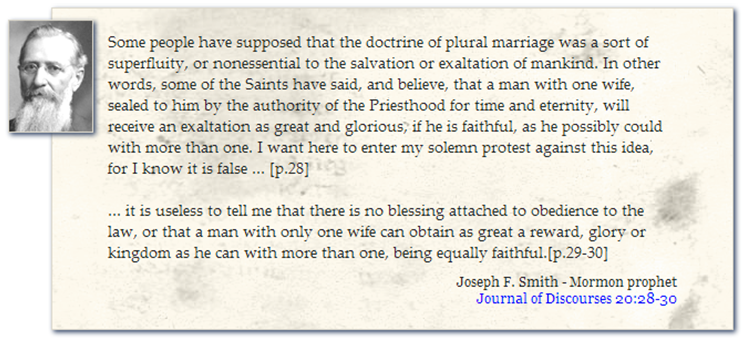
FairMormon is ignoring the main point and argument in the “Prophets” section of my letter: Yesterday’s prophets (Brigham and other early prophets) are today’s heretics and yesterday’s doctrine (polygamy = godhood) is today’s false doctrine (Hinckley’s “polygamy is not doctrinal”).
Ban on Black People
"As a believing member, I had no idea that Joseph Smith gave the priesthood to Black men. I’m supposed to go to the drawing board now and believe in a god who is not only a schizophrenic racist but who is inconsistent as well?"
- FairMormon agrees and admits “we do not know” while offering 3 different scenarios in their attempt to rationalize the ban.
- The Church released a new essay on Race and the Priesthood. FairMormon deleted their original response.
Sometimes God withholds certain blessings from certain people without explaining why He does this. Sometimes this is a willful decision on His part expressed via direct revelation to his prophet. At other times, God allows his prophets to act as they feel best. In the case of the priesthood ban, we do not know which of these scenarios is applicable. What we do know, however, is that the ban was lifted by revelation in God's due time.
FairMormon deleted their above response. See screenshot.
Jeremy's Response
FairMormon's above response got debunked by none other than the Church itself on December 6, 2013 when the Church released its new Race and the Priesthood essay. Consequently, FairMormon had to delete their above response, which they did so on the same day.
FairMormon's new response is from the Church's new essay:
During the first two decades of the Church’s existence, a few Black men were ordained to the priesthood. One of these men, Elijah Abel, also participated in temple ceremonies in Kirtland, Ohio, and was later baptized as proxy for deceased relatives in Nauvoo, Illinois. There is no evidence that any Black men were denied the priesthood during Joseph Smith’s lifetime.
In 1852, President Brigham Young publicly announced that men of black African descent could no longer be ordained to the priesthood, though thereafter Black individuals continued to join the Church through baptism and receiving the gift of the Holy Ghost. Following the death of Brigham Young, subsequent Church presidents restricted Black individuals and families from receiving the Temple endowment or being married in the temple. Over time, Church leaders and members advanced many theories to explain the priesthood and Temple restrictions. None of these explanations is accepted today as the official doctrine of the Church.
Today, the Church disavows the theories advanced in the past that black skin is a sign of divine disfavor or curse, or that it reflects actions in a premortal life; that mixed-race marriages are a sin; or that blacks or people of any other race or ethnicity are inferior in any way to anyone else. Church leaders today unequivocally condemn all racism, past and present, in any form.
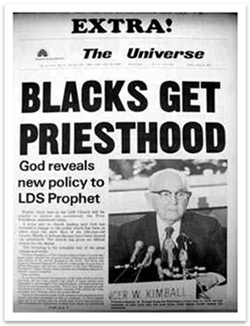
The Church - through its new essay - effectively threw 10 "prophets, seers, and revelators" under the bus by "disavowing" the "theories" (then known as "doctrine", "revelation", and "teachings of Latter-day prophets") that were used by these "prophets, seers, and revelators" for 130 years as justification for its institutional and theological racism.
Yesterday's doctrine and revelation is today's disavowed theories. Yesterday's prophets are today's disavowed heretics.
We just need to edit out the racism and the "black skin is a sign of divine disfavor or curse" stuff in the keystone Book of Mormon and we'll be set.
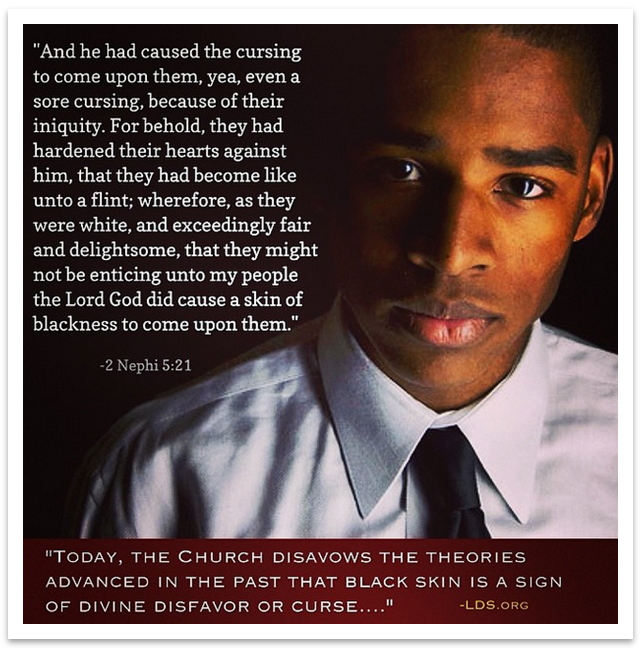
Mocking language and hyperbole—The critic intentionally exaggerates claims in order to mock believers.
Latter-day Saints do not believe in a God who is a "schizophrenic racist."
FairMormon deleted their above response. See screenshot.
Jeremy's Response
What did I “exaggerate”? How am I “mocking believers”?
Did the Mormon god and His prophets block and deny Black individuals and families from the saving ordinances of the Temple and from the Priesthood for 130 out of 183 years? Yes.
Mormon god likes and accepts Black people under Joseph Smith. Mormon god doesn’t like and blocks Black people under Brigham Young and His next 9 prophets for 130 years. Mormon god changes mind in 1978 and again likes and accepts Black people. How is this not a “part-time racist schizophrenic” god?
There was a Black member of the Church by the name of Jane Elizabeth Manning James. Like any believing Latter-day Saint, she wanted to be sealed to her children. She petitioned to the First Presidency to be sealed to Walker Lewis. Her petitions were consistently ignored or refused. Desperate, she asked in 1891 to be sealed to the Smith family. Instead, the First Presidency decided she might be adopted into the family of Joseph Smith as a servant, which was done, in a special ceremony in the Temple with Joseph F. Smith acting as a proxy for Joseph Smith and Bathsheba W. Smith acting as proxy for Jane James (who was not allowed into the temple for the ordinance). In the ceremony, Jane was “attached as a Servitor for eternity to the prophet Joseph Smith and in this capacity be connected with his family and be obedient to him in all things in the Lord as a faithful Servitor.”
Elijah Abel and Walker Lewis both received the Priesthood under Joseph Smith. Brigham Young put the Priesthood/Temple ban in place in 1852. At least two of Abel’s descendants – Enoch and Enoch’s son Elijah – were ordained to the Priesthood, which contradicted the Church’s ban. The former in 1900 and the latter in 1935. Of course, the ban instituted by Young was removed by Kimball in 1978.
Are we to believe that the Mormon god was okay with giving the Priesthood under Joseph Smith but not under Brigham Young and the next 9 prophets for 130 years before relenting and giving thumbs up to Kimball in 1978? That the Mormon god was okay with his spokesmen on earth denying Sister Manning’s pleas to be sealed to her children only to seal her instead as Joseph Smith’s slave for all eternity? Not only was this despicable act condoned and approved by the First Presidency but a “prophet, seer, and revelator” (Joseph F. Smith) stood as proxy for that very despicable ceremony.
Whether or not Latter-day Saints adequately understand these historical facts does not alter or diminish the record that the Church and its prophets for 130 years pointed to the Mormon god for justification of its institutional and theological racism.
Mark Hofmann
"In the early to mid-1980’s, the Church shelled out close to $900,000 in antiquities and cash to Mark Hofmann – a conman and soon-to-be serial killer – to purchase and suppress bizarre and embarrassing documents into the Church vaults that undermined and threatened the Church’s story of its origins. The documents were later proven to be forgeries....Lack of discernment by the Brethren on such a grave threat to the Church."
- FairMormon agrees but attempts to diminish expectations of discernment from the Brethren over such a grave and dangerous threat to the Church.
As with many criticisms, this one stems from incorrect expectations of what a prophet is. Prophets are not omniscient nor infallible. The Church bought the documents when assured by experts that they were genuine.
FairMormon deleted their above response. See screenshot.
Jeremy's Response
No. This stems from the correct expectation that prophets should be honest. This stems from the correct expectation that prophets should be transparent. This stems from the correct expectation that true prophets should at least have the basic discernment of a very grave and serious threat against the Church they hold a stewardship over. This stems from the correct expectation that “prophets, seers, and revelators” do not give apologetic talks in General Conference defending completely fake and false documents which exist to destroy the Church. This stems from the correct expectation that prophets do not use shady and illegal methods in backroom business deals to get what they want, as in this case with the Church providing an illegal $185,000 loan to Hofmann.
The fact that the Church bought the documents because they believed they were genuine is part of the problem. These documents were embarrassing. They were damaging to the Church’s truth claims. They were a direct threat to not only the Church’s story of its origins but also of its right to succession claims. Part of the problem is that the Church bought these documents only to turn around and throw them into the Church vault hoping they would never again see the light of day.
Mormons are taught that the “power of discernment” is a gift of the Spirit and that Priesthood leaders are entitled to this power of discernment as “judges of Israel”. In fact, Elder Gene Cook stated the following in April 1978:
“It is abundantly clear that presiding priesthood leaders are given the gift of discernment.”
Elder Packer stated in September 2005:
“There is a power of discernment granted ‘unto such as God shall appoint…to watch over [His] church.’ To discern means to ‘to see’.”
As presiding priesthood leaders, where was the gift of discernment in the First Presidency and the Quorum of the Twelve when an enemy of the Church, Mark Hofmann, was effectively threatening and undermining the Lord’s Church under their very watch, care, and stewardship?
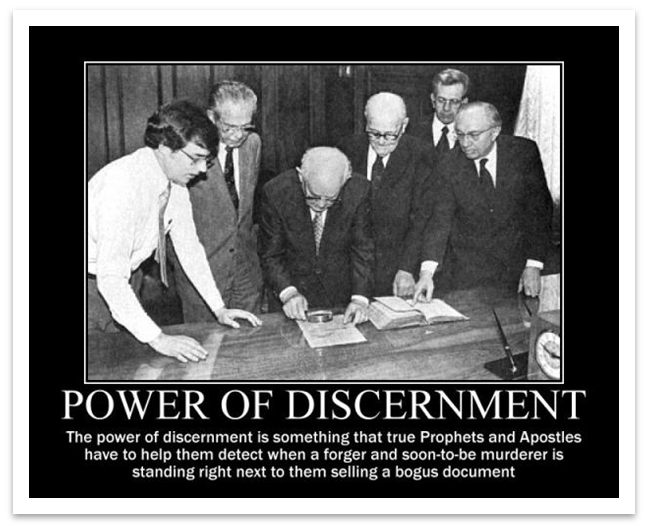
Prophets do not generally act to take away the free agent choices of others. President Hinckley's decision to purchase the documents allowed them to be examined, and kept them available for further study so that the forgery could be discovered. (Had a private collector, especially one hostile to the Church, acquired the documents, access might have been much more difficult.
FairMormon deleted their above response. See screenshot.
Jeremy's Response
This argument by FairMormon does not match the evidence. Several of the documents that President Hinckley bought were thrown into the First Presidency vault. They would not have reached the light of day had Hofmann not leaked to the press that the Church bought certain documents. It was only when the press started asking questions about the documents that President Hinckley and the Church were forced to concede that they did indeed purchase the documents from Hofmann and that they were in the Church’s possession.
The Church bought the McLellin journals from Hofmann. The Church already had the McLellin journals in their archives and didn’t reveal so until after Mark Hofmann’s murder trial; and only because a Salt Lake reporter discovered this fact and made it public. This alone disproves FairMormon’s absurd claim that they were purchasing the documents from Hofmann to “study its authenticity”. The Church has a long history of hiding documents in their vaults and keeping even BYU researchers and LDS historians from accessing its archives.
Besides, let’s assume that hostile enemies of the Church obtained the documents. So what? These “enemies” would have to have the documents verified by independent appraisers and authenticators. If the enemies were to go public with their claims, the Church would have every right to tell the enemies to “put up or shut up” by allowing independent auditors to verify or discredit the document’s authenticity.
Of course, the Church doesn’t want this to happen because its worst nightmare would be to have the documents verified as authentic and this truth would be out in the public square. It is preferable for the Church to have the documents nicely tucked away into its dark vaults never to be seen or investigated again. And this is exactly why President Hinckley and the Church bought these documents from Hofmann in the dark.
FairMormon’s argument that the Church purchased the documents “for further study so that the forgery could be discovered” is absurd. First of all, this argument assumes that the Church knew the documents were forged. The Church didn’t pay hundreds of thousands for fake documents to “study” their authenticity. Such a proposition is unreasonable and I’ve never seen any evidence that the Church undertook any sort of examination of the documents’ authenticity after purchasing them.
The Church spent hundreds of thousands of dolalrs because they believed these extremely dangerous and embarrassing documents were authentic and that they threatened the Church’s truth claims. The Church’s intention was exactly what they demonstrated in action: to suppress the documents by putting them into their vaults. We saw this practice not just with Hofmann’s forgeries but we’re still seeing this practice today with the Church’s suppression of journals, documents, and other historical items in their vaults. Respected Mormon and non-Mormon Historians have been trying for decades to access critical documents and journals only to be repeatedly denied access by the Church. We can only presume that the hidden documents are adverse to the truth claims of the Church.
Hofmann made the decision to lie and cover his lies with murder. Tragic as such choices are, LDS doctrine would not expect God to typically intervene via a prophet, or personally, to prevent a person bent on making wicked choices from carrying out his or her plans. (See DC 10:37 If God did so routinely, unfettered choice would be threatened.
FairMormon deleted their above response. See screenshot.
Jeremy's Response
This is not about Hofmann’s decision to murder or about God intervening in that decision. This is about the Church and its “prophets, seers, and revelators” being dishonest, deceptive, and shady in their dealings with Mark Hofmann and his forgeries. Additionally, this is about the complete lack of discernment on the part of these “prophets, seers, and revelators” in defending the Church, in which they held stewardship over, from such a grave and serious threat.
Whatever happened to “it is better than one man should perish than that a nation [people] should dwindle and perish in unbelief”? Many members became very troubled with the forgeries and the way the Church handled the situation. Many members have left and are leaving the Church due to the dishonesty and lack of discernment on the part of the Brethren over such a grave threat to the Church by Hofmann.
Let’s take a step back here and look at the big picture. Due to the failure of these “prophets, seers, and revelators” to detect and protect the Church they held stewardship over from Mark Hofmann’s several years of scamming the Church, two innocent people were murdered in 1985. These two individuals, Steven Christensen and Kathy Sheets, would likely still be alive today if the Brethren were actually “prophets, seers, and revelators” who had the gift of discernment to protect and defend the very institution they were supposedly commissioned by God Himself to protect and defend.
FairMormon quotes from President Hinckley in their “Quotes to consider” section (FairMormon and quote are in red while my comments are in black):
President Hinckley, at a Young Adult fireside broadcast from Temple Square, spoke about Martin Harris and others mentioned in the Salamander Letter, and advised caution in accepting the documents' authenticity. He was careful not to proclaim that they were authentic:
Of course President Hinckley was “careful not to proclaim that they were authentic”. President Hinckley gave this fireside talk on June 23, 1985. By then it was no secret that the documents might possibly be forgeries. The Tanners publicly denounced them as forgeries in March 1984. President Hinckley was aware by June 1985 that there was a controversy regarding the documents that he believed were genuine and which he bought and defended in previous years.
Where was President Hinckley’s skepticism in April 1981 of the document’s authenticity when he gave a General Conference talk about the Joseph Smith III Blessing (which we now know is fake)?
"As most of you know, recently there have been great stirrings over two old letters. One was purportedly written in 1825 by Joseph Smith to Josiah Stowell. If it is genuine, it is the oldest known product of Joseph Smith’s handwriting. It concerns the employment of Joseph by Mr. Stowell, who was engaged in a mining operation looking for old coins and precious metals. The other carries the date of October 23, 1830, and was purportedly written by Martin Harris to W. W. Phelps.
I acquired for the Church both of these letters, the first by purchase. The second was given to the Church by its generous owner. I am, of course, familiar with both letters, having held them in my hands and having read them in their original form. It was I, also, who made the decision to make them public. Copies were issued to the media, and both have received wide publicity.
I knew there would be a great fuss. Scholars have pored over them, discussed them, written about them, differed in their opinions, and even argued about them.
I am glad we have them. They are interesting documents of whose authenticity we are not certain and may never be. However, assuming that they are authentic, they are valuable writings of the period out of which they have come. But they have no real relevancy to the question of the authenticity of the Church or of the divine origin of the Book of Mormon."
I disagree. They actually do have real relevancy to the question of the authenticity of the Church and of the divine origin of the Book of Mormon. The documents undermined the Church’s claim of succession as well as the Church’s correlated story of its origins as well as the Church’s correlated story of how the Book of Mormon came to be.
"Much has been said about the Martin Harris/W. W. Phelps letter. I ask: Shall two men, their character, their faith, their lives, the testimonies to which they gave voice to the end of their days, be judged by a few words on a sheet of paper that may or may not have been written by the one and received by the other?"
"If you have been troubled in any way by press reports concerning this letter, I ask only that you look closer at the man who presumably wrote it and at the man who presumably received it Martin Harris and W. W. Phelps.
The letter is dated subsequent to the declaration of the Testimony of the Three Witnesses, one of whom was Martin Harris. In language unequivocal and certain he and his associates had declared to the world: "Be it known unto all nations, kindreds, tongues, and people, unto whom this work shall come: That we, through the grace of God the Father, and our Lord Jesus Christ, have seen the plates which contain this record,...And we also know that they have been translated by the gift and power of God, for his voice hath declared it unto us; wherefore we know of a surety that the work is true.... And we declare with words of soberness, that an angel of God came down from heaven, and he brought and laid before our eyes, that we beheld and saw the plates, and the engravings thereon."
President Hinckley tells us to just rely on Martin Harris. Never mind that Martin:
- made conflicting statements about his experience
- held a reputation as a very superstitious and gullible man
- joined 5 other different religions (including Mormon offshoots)
- went on a mission for self-proclaimed prophet and Joseph Smith successor James Strang
- was a witness for self-proclaimed prophet and Joseph Smith successor Gladden Bishop's claims and scriptures
- ...and reportedly stated that he had as much evidence for a Shaker book as he had for the Book of Mormon.
"Would Martin Harris have mortgaged his farm, eventually losing it, to pay for the printing of the Book of Mormon if he had thought of that book as a fraud? He endured ridicule, persecution, and poverty. He lived to the age of ninety-two and died in full faith, voicing his testimony of the truth of the Book of Mormon to the end of his life."
Delusional people making great sacrifice for their beliefs does not mean that their beliefs are factually true. Every religion has their heroes and martyrs. Do their sacrifices translate into the validity and truthfulness of their religious claims as well?
Further, there are numerous people who have gone to their graves never having denied seeing a UFO, or being abducted by aliens, or seeing the Virgin Mary, seeing God, or glimpsing the Loch Ness Monster. If truth is measured by one’s persistence and insistence of a perceived experience and claim, we’ve got a problem.
"What about W. W. Phelps? Five years subsequent to the date of the letter, he wrote: ‘Now, notwithstanding my body was not baptized into this Church till Thursday, the 10th of June 1831, yet my heart was there from the time I became acquainted with the Book of Mormon; and my hope, steadfast like an anchor, and my faith increased like the grass after a refreshing shower, when I for the first time, held a conversation with our beloved Brother Joseph whom I was willing to acknowledge as the prophet of the Lord, and to whom, and to whose godly account of himself and the work he was engaged in, I owe my first determination to quit the folly of my way, and the fancy and fame of this world, and seek the Lord and His righteousness.’
This is the same man who wrote that majestic and marvelous hymn of tribute to the Prophet Joseph — 'Praise to the man who communed with Jehovah! Jesus anointed that Prophet and Seer. Blessed to open the last dispensation, Kings shall extol him, and nations revere.'
He had no doubt concerning the divine origin of the Book of Mormon or the divine calling of him who was the instrument in the hands of the Almighty in bringing it forth. William W. Phelps died as a high priest in Salt Lake City in full faith.
Marvelous and enduring love and loyalty of the kind shown by these two men do not come from an experience with a ‘salamander’ as we generally interpret that word.
Would these two men have so endured, so declared their testimonies, and so lived out their lives in faith had there been any doubt about the way in which the Book of Mormon plates were received from the hands of Moroni and translated by the gift and power of God?"
Again, if truth is measured by one’s persistence and insistence of a perceived experience and claim then we’ve got a problem due to similar persistence and insistence seen in countless other religions.
Why follow the prophet when a prophet is just a man of his time?
“Why would I want them following the prophet when a prophet is just a man of his time?”
- FairMormon disagrees while arguing that prophets are products of their own time and culture.
How could the prophets by anything but ‘men of their time’? What does the author expect any prophet to be, other than a product of his own time and culture?
FairMormon deleted their above response. See screenshot.
Jeremy's Response
When his time and culture is ripe with rampant immorality as was the case of Brigham Young? Absolutely. When he has millions of believers looking up to him for example, direction, and guidance? Absolutely. When he has a direct line to supposedly one of the most moral Beings in the universe who can see past, present, and future? Absolutely.
But then again, when you have a schizophrenic and inconsistent god who endorses slavery, selling daughters into sexual slavery, rape, polygamy, murder, infanticide, genocide as we see in the scriptures, I’m probably asking and expecting too much of the Mormon god.
In the “When the prophet speaks the debate is over” section, FairMormon points to the prophet being the final voice in matters of morality. If defining, defending, and exemplifying morality is part of the prophet’s job description, it is beyond reasonable to expect the most “moral” Being in the universe to slap Brigham upside the head to get it right that slavery is not okay, sexism is not okay, racism is not okay, and neither is blood atonement. What does it say about Brigham Young and other prophets being “god’s spokesmen on earth” when there were secular individuals of their time and culture, without a direct line to god, who possessed superior moral blueprints than these “prophets”? Secular men who not only opposed slavery, racism, and sexism in that time and culture but who actually acted to help reform and elevate the moral blueprint of their society?
It is clear that the Brethren in the past were merely products of their prevailing culture with all of its inherent prejudices, homophobia, racism, and bigotry. The Church itself agrees with this as it pins in its new essay the Church's racism and Priesthood ban on yesterday's "prophets, seers, and revelators" just being men who taught doctrines (now called "theories") of their time. True prophets of God would and should transcend all of that.
If a prophet of God, allegedly the most spiritually sensitive mortal on the planet and the conduit for God’s will on earth, cannot tell the difference between his own opinions and ideas and God’s will, then what good is he?
In the case of the Church’s institutional and theological racism, if these “prophets, seers, and revelators” were “speaking as men and not prophets,” why did God allow these men to speak ill in his name? Would not a Heavenly Father “inspire” these men to speak His truth? Why would Heavenly Father allow his reputation to be defamed and His children denied access to the saving ordinances of His Temple by his own “spokesmen”? If these “prophets of God” could not tell the difference between their own limited views of humanity and inspiration from God, how can we possibly trust anything these men say or claim? Again, if a prophet’s moral blueprint is not much better than my kid’s Sunday School teacher? He’s useless in the morality department.
Further, we’re not seeing prophets prophesying, seers seeing, and revelators revealing. Why then are we sustaining and following these “prophets, seers, and revelators” when they’re doing none of those things?
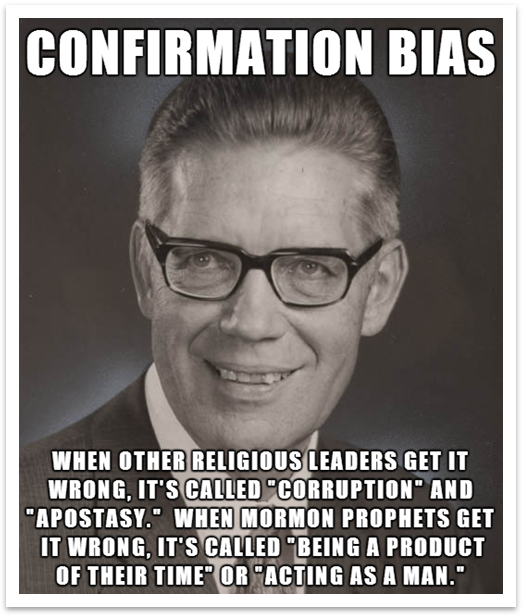
I’m going to let Brother Jake quickly wrap up the Prophets section:
